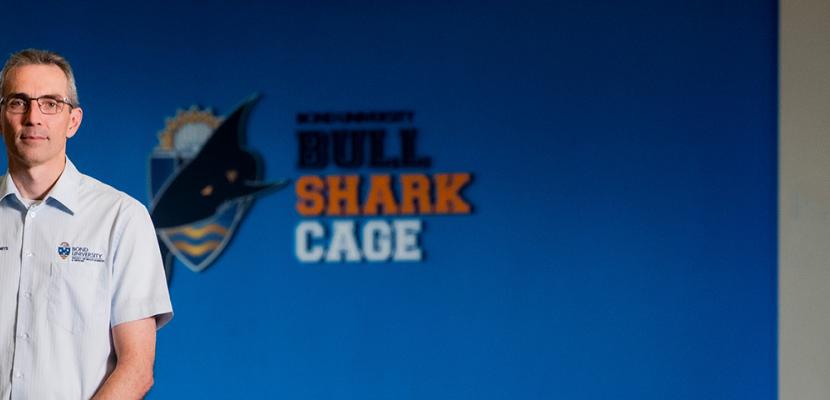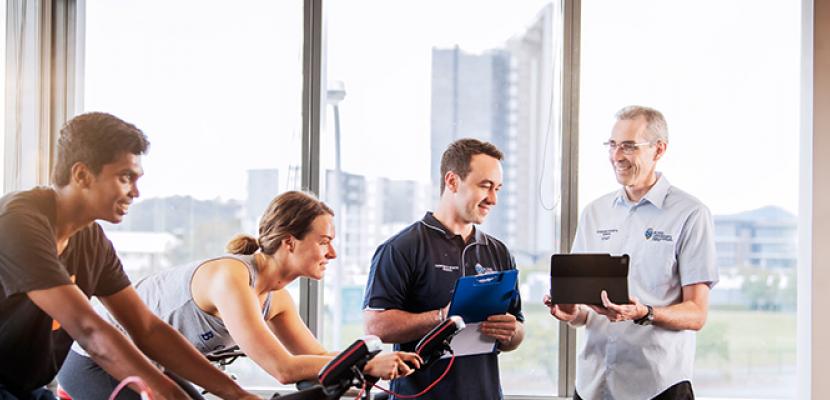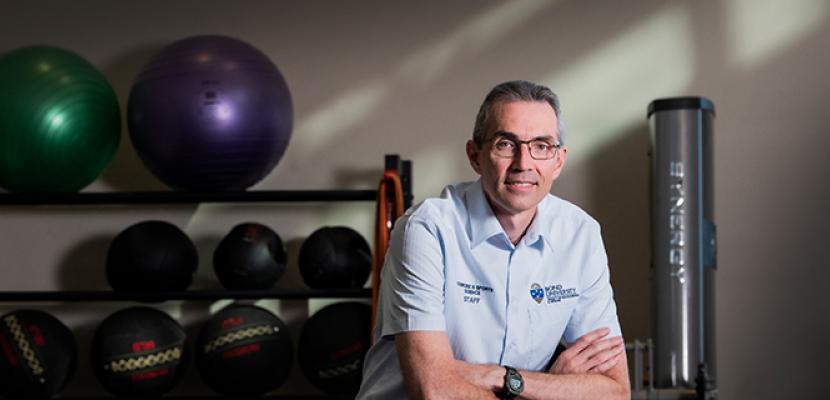
Earlier this year, Associate Professor Vernon Coffey took over the reins as Head of Program for Sport and Exercise Science in the Faculty of Health Sciences & Medicine. We spoke to Vernon about his journey to Bond, his passion for sport and exercise science, what he loves about his job and what he’s looking forward to most about his new role…

Q: What was your career journey to becoming Head of Program at Bond?
I grew up in Feilding, a small town in the lower north island of New Zealand and to be honest, I wasn’t a good student and struggled through high school. I really only went to school to eat my lunch and play basketball.
After leaving school it took me six years to secure my first job, which involved a process of manually feeding paper into a recycling machine which then turned it into insulation for housing. I definitely didn’t enjoy it and knew this wasn’t what I wanted to do.
I wanted to do something I was more passionate about – which was sport – which led me to decide to attend TAFE with the aim to work in a gym.
Although I was petrified at the thought of study, for the first time in my life I worked as hard as I possibly could and when it came to the first test – I smashed it and was the only student to score 100%! This achievement flicked a switch for me and I thought ‘I can actually do this’. From here, I went on to become the top student of my year and earned a place at University.
I completed my Bachelor of Sport and Exercise Science, with Honours, at the Waikato Institute of Technology in Hamilton (NZ). My Honours research project was one of the first in the world at that time to determine the effectiveness of hot and cold water immersion for athlete’s recovery. I was lucky enough to have a great support network and learn from my primary supervisor, the now Head of Strength & Conditioning for the All Blacks – Nick Gill. That year was when I got hooked on research, the chance to address sport science questions we don’t have answers to became a passion. Securing a full scholarship to cross the pond and earn my PhD in Exercise Physiology at RMIT University in Melbourne - where my supervisor and mentor was one of Australia’s most respected physiologists, John Hawley, only accelerated my educational journey.
With my PhD under my belt, I spent several years as a full-time researcher in Exercise Science at RMIT, then 18 months in a dual role as Senior Lecturer/Researcher at QUT in Brisbane, before relocating to the Gold Coast to join Bond as an Associate Professor of Exercise and Sport Science in December 2014.

Q: You're clearly passionate about sport. So how did you end up as a sport & exercise science researcher and teacher?
Like most of us in exercise and sports science, I’m interested in all sports and grew up in a household where there was always sport on the television – it didn’t really matter which sport it was and unsurprisingly there was a fair amount of rugby, although I did manage to become an AFL convert during my time in Melbourne. Very controversial for a New Zealander to say but it turns out a good game of AFL is better than a good of rugby. Then again, neither of them come close to a good game of basketball!
I guess I’m what you could call a ‘failed athlete’.
Basketball was my big thing and I did make the very end (I mean way down the very end) of an NBL side in New Zealand, but I realised I didn’t have what it takes and it was then that I started studying. Soon after, while I still enjoyed playing basketball all year around and study, I soon came to the realisation I really wanted to commit to my studies, I was enjoying it so much.
I initially did a certificate in exercise physiology, but once I started learning and growing my knowledge of the human body, how it works and how it is affected by exercise – I realised just one year wasn’t enough, so went on to do a second-year diploma and from there a full degree program.
I fell in love with research. I had so many questions and wanted to be the first to discover effects and mechanisms of exercise on the human body, especially our muscles. It was this quest for discovery that led me to my PhD as a mature age student hitting my 30’s.
I have a strong empathy for people starting as mature age students and strive to be a good influence on, and for, them. I really enjoy passing on knowledge, interacting with students and instilling in them a passion for exercise and sports science. I believe research and teaching complement each other beautifully: you can take what you learn from research and work that into the curriculum to pass onto your students.
Q: What do you enjoy most about sport and exercise science?
Learning about how cells and organ systems adapt to exercise is what initially fascinated me with this industry – and what I still enjoy most about my job! It’s never static. I continue to learn something new every day, as new research develops, and we find out more about how the human body responds to exercise and nutrition. It’s a very exciting field to be part of.
Can we provide new information that’s going to help an athlete in their performance; can we add that 1% to an athlete’s performance capacity – whether that be in the water, chasing a ball or participating in team sports? It’s these kinds of challenges that continue to interest and motivate me.
I love that you are always dealing with new knowledge and translating research into improving human health and performance. For me, it’s about bridging the gap between laboratory science and applied sports science.
I’m also a firm believer in putting my muscle where my mouth is – to date I’ve had 27 muscle biopsies – all in the name of science!
Q: What are you most looking forward to in new role as Head of Program?
I’m really looking forward to our new Bachelor of Exercise and Sports Performance which has its first intake in September (203). What makes it so exciting is its flexibility. Students can learn the science of exercise and sport, but then customise their program in line with their career ambitions by choosing from 15 majors including marketing, big data, entrepreneurship and innovation, global studies and tourism management – to name just a few. I am also keen to explore how we can add micro-credentials to our offerings.
As Head of Program, I want to continue to push the program’s development by providing new content and outstanding education and work opportunities for our students. I will focus on continuing to meet those high standards required for our industry accreditations and maximising our amazing, world-class facilities and our talented team.
Exercise and Sports Science at Bond
Learn from the best in the industry and join Vernon and the team at Bond University.